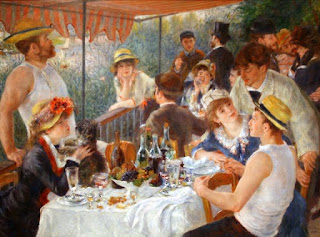I started a process of reading novels (somewhat for the first time) about six years ago. I am working my way through the top 100 English novels of all times. A number of these novels were written by the likes of Hemingway, Joyce and Fitzgerald. I'm now reading a contemporary of theirs, Saul Bellow. I'm not sure if Bellow's path ever crossed the aforementioned authors as they were part of the Les Années Folles (the crazy years) in Paris and he was not. However, all of these authors, plus others like Lowry, wrote of similar experiences and those experiences must have been reflective of their own lives.
As an Evangelical I would look at these people as an example of the hideousness of sin. Each book is written with the ink of alcohol, depression, divorce, murder, incest and more than a few wars and old fashioned fist-fights. They were people, often rich people, adrift on a sea of chaos and confusion.
Sometimes, while I don't envy these people . . . or at least I don't think so . . . I really wonder as an evangelical if I really stood on a higher ground.
It reminds me of a poem a patient wrote called An Ode to Prozac. The first line of her poem was "The question is to feel . . . or not to feel."
The people living in Les Années Folles of Paris in the 1930s felt. They felt deeply. They felt music, art, love, grief, the effects of alcohol and ruin. But they felt.
As an evangelical we were taught not to feel. Feeling meant we were human and a good Christian, so we thought, were transfigured humans. That of course wasn't true but we had to pretend that it was. We couldn't feel sad. We couldn't feel pain. We couldn't feel ruin.
While I may not long for the chaos of all that was there within the lives and worlds of Les Années Folles . . . but maybe enjoy feeling and long for all those years I missed feeling.
As an Evangelical I would look at these people as an example of the hideousness of sin. Each book is written with the ink of alcohol, depression, divorce, murder, incest and more than a few wars and old fashioned fist-fights. They were people, often rich people, adrift on a sea of chaos and confusion.
Sometimes, while I don't envy these people . . . or at least I don't think so . . . I really wonder as an evangelical if I really stood on a higher ground.
It reminds me of a poem a patient wrote called An Ode to Prozac. The first line of her poem was "The question is to feel . . . or not to feel."
The people living in Les Années Folles of Paris in the 1930s felt. They felt deeply. They felt music, art, love, grief, the effects of alcohol and ruin. But they felt.
As an evangelical we were taught not to feel. Feeling meant we were human and a good Christian, so we thought, were transfigured humans. That of course wasn't true but we had to pretend that it was. We couldn't feel sad. We couldn't feel pain. We couldn't feel ruin.
While I may not long for the chaos of all that was there within the lives and worlds of Les Années Folles . . . but maybe enjoy feeling and long for all those years I missed feeling.





No comments:
Post a Comment